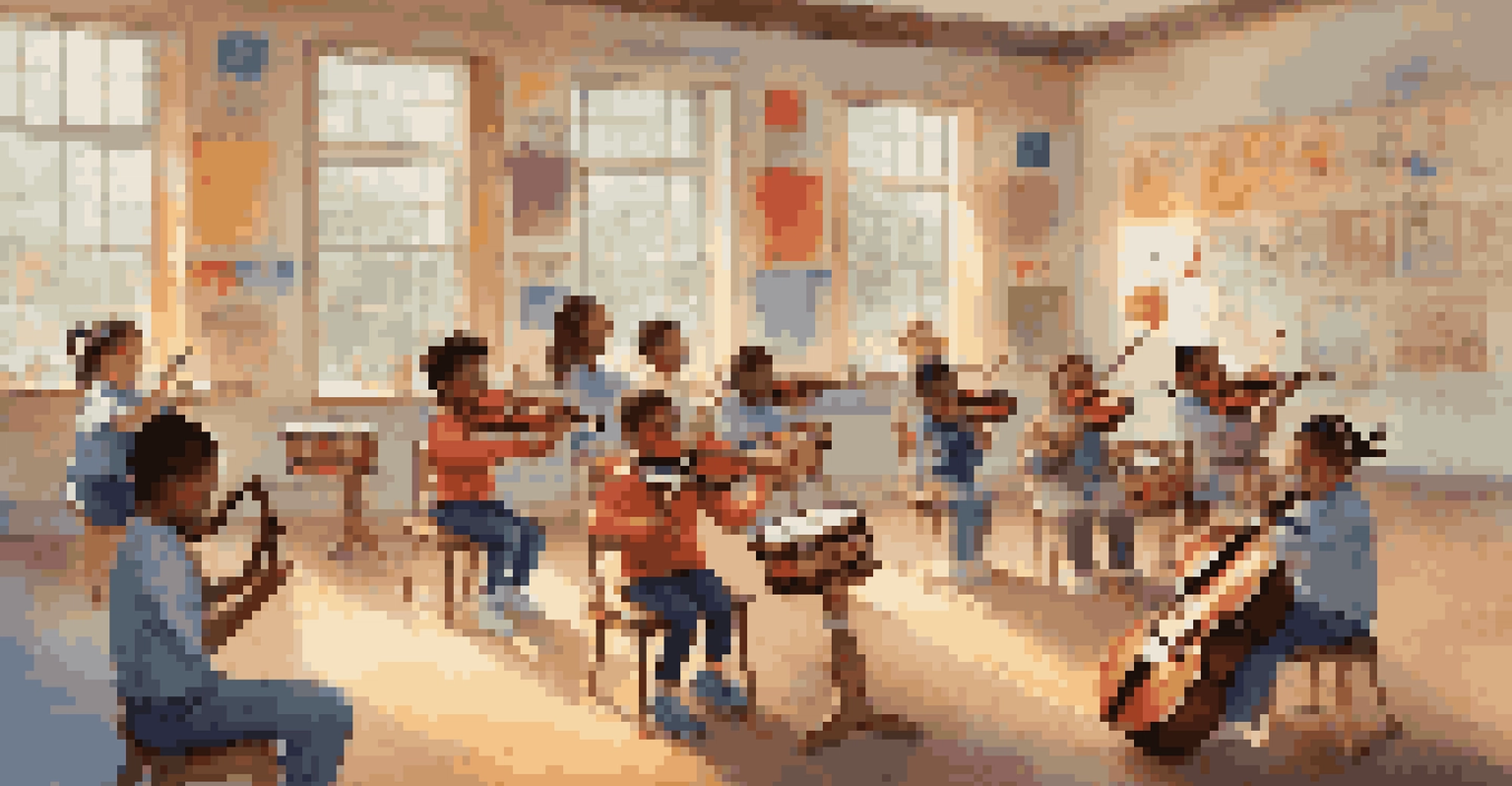Exploring the Music-Psychology Connection: A Review

Understanding the Basics of Music and Psychology
Music and psychology may seem like two separate worlds, but they intertwine in surprising ways. At its core, psychology studies human behavior and mental processes, while music serves as a universal language that can evoke emotions and memories. By exploring how music affects our minds, we can better understand our emotional responses and cognitive functions.
Music can change the world because it can change people.
For instance, think about how a particular song can transport you back to a specific moment in time. This connection highlights the power of music in shaping our emotional landscape and influencing our moods, making it a rich area for psychological exploration.
Understanding this connection not only enhances our appreciation of music but also opens up new avenues for mental health therapies that incorporate musical elements.
The Emotional Impact of Music on Our Lives
Music has a unique ability to tap into our emotions, often providing a soundtrack to our daily experiences. Whether it's a joyful tune that lifts our spirits or a somber piece that resonates with our struggles, music reflects and shapes our emotional states. Research shows that listening to music can elevate mood and even alleviate symptoms of anxiety and depression.

Consider how you might turn up your favorite upbeat playlist when preparing for a big event. The rhythm and melodies can energize you and bolster your confidence, demonstrating how music influences our behavior and mindset.
This emotional resonance is not just anecdotal; studies consistently support the idea that music can be a powerful tool for emotional regulation.
Music Therapy: Bridging Psychology and Healing
Music therapy is a fascinating application of the music-psychology connection, where trained therapists use music to address emotional and psychological needs. This therapeutic approach can help individuals cope with a range of issues, from trauma to developmental disorders. By engaging with music, clients can explore their feelings and express themselves in ways that might be difficult otherwise.
Where words fail, music speaks.
For example, a therapist might use songwriting as a way for a client to articulate feelings that are hard to verbalize. This creative process can foster healing and self-discovery, illustrating the profound impact music can have on mental well-being.
As research continues to support the efficacy of music therapy, its integration into conventional treatment plans is becoming more common, offering hope to many.
The Cognitive Benefits of Music Engagement
Listening to or playing music can enhance cognitive functions, such as memory, attention, and problem-solving skills. For instance, studies suggest that learning to play an instrument can improve brain development in children, as it engages multiple areas of the brain simultaneously. This multi-faceted engagement not only aids in cognitive growth but also fosters discipline and perseverance.
Think of it like exercising your brain—just as physical workouts strengthen muscles, musical practice builds neural pathways. This is why many educators advocate for music education as a vital component of a well-rounded curriculum.
Moreover, adults who engage with music regularly often report improved memory recall and mental agility, further demonstrating music's role as a cognitive booster.
The Social Aspects of Music and Psychology
Music is inherently social, often bringing people together and creating a sense of community. Whether it's at concerts, festivals, or casual gatherings, sharing musical experiences can strengthen social bonds and foster a sense of belonging. This social aspect is crucial, as human beings are inherently social creatures who thrive on connections with others.
Consider how singing along to your favorite song with friends can create unforgettable memories and deepen relationships. These shared experiences can enhance feelings of empathy and understanding, bridging gaps between individuals.
Research shows that engaging with music in a group setting can boost mood and foster cooperation, making it a powerful tool for social cohesion.
Cultural Influences on Music and Psychological Perception
Cultural background plays a significant role in how we perceive and respond to music. Different cultures have unique musical styles, traditions, and emotional expressions that shape our understanding of music's role in society. This cultural lens influences not just the music we enjoy, but also how we relate to it psychologically.
For example, a lullaby in one culture may evoke feelings of comfort and safety, while in another, it might carry different associations. Such variations highlight the importance of considering cultural context when exploring the music-psychology connection.
Understanding these influences can enrich our appreciation of global music and its psychological implications, reminding us that music is a universal yet deeply personal experience.
Future Directions: Research and Beyond in Music Psychology
As we continue to explore the music-psychology connection, the future of research in this field looks promising. Advancements in technology, such as brain imaging techniques, allow scientists to study how music interacts with various cognitive and emotional processes in real-time. This research holds the potential to unlock new insights into how music can be harnessed for therapeutic purposes.
Imagine a future where personalized music playlists are tailored to enhance mental health or cognitive performance based on individual brain activity. This intersection of music, psychology, and technology presents exciting opportunities for innovative treatments and interventions.

As we delve deeper into this connection, we can anticipate even more ways to integrate music into our lives for improved mental health and well-being.